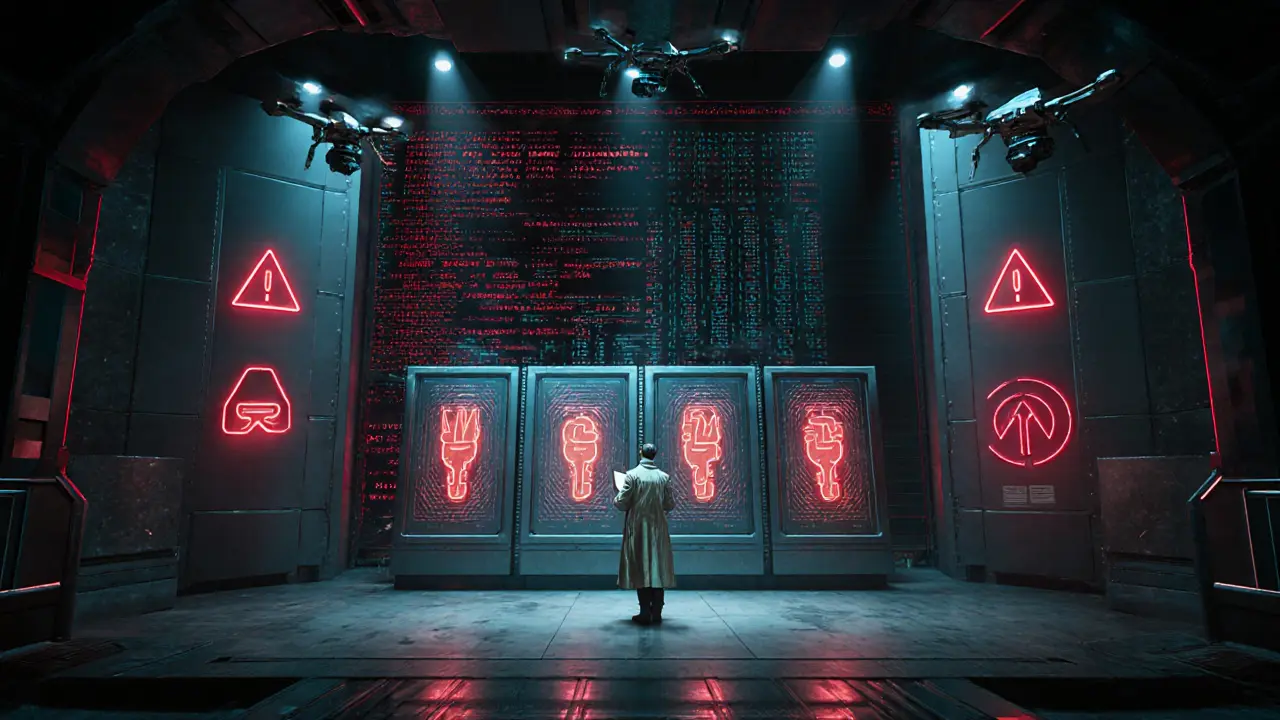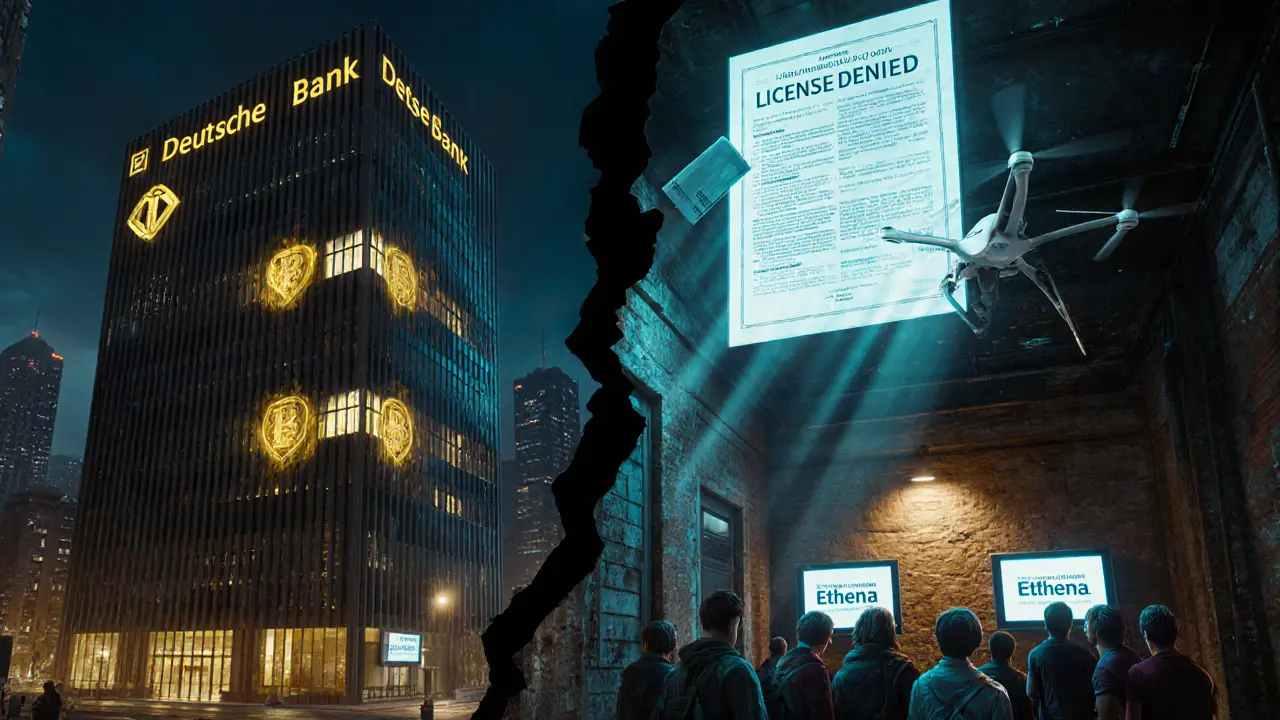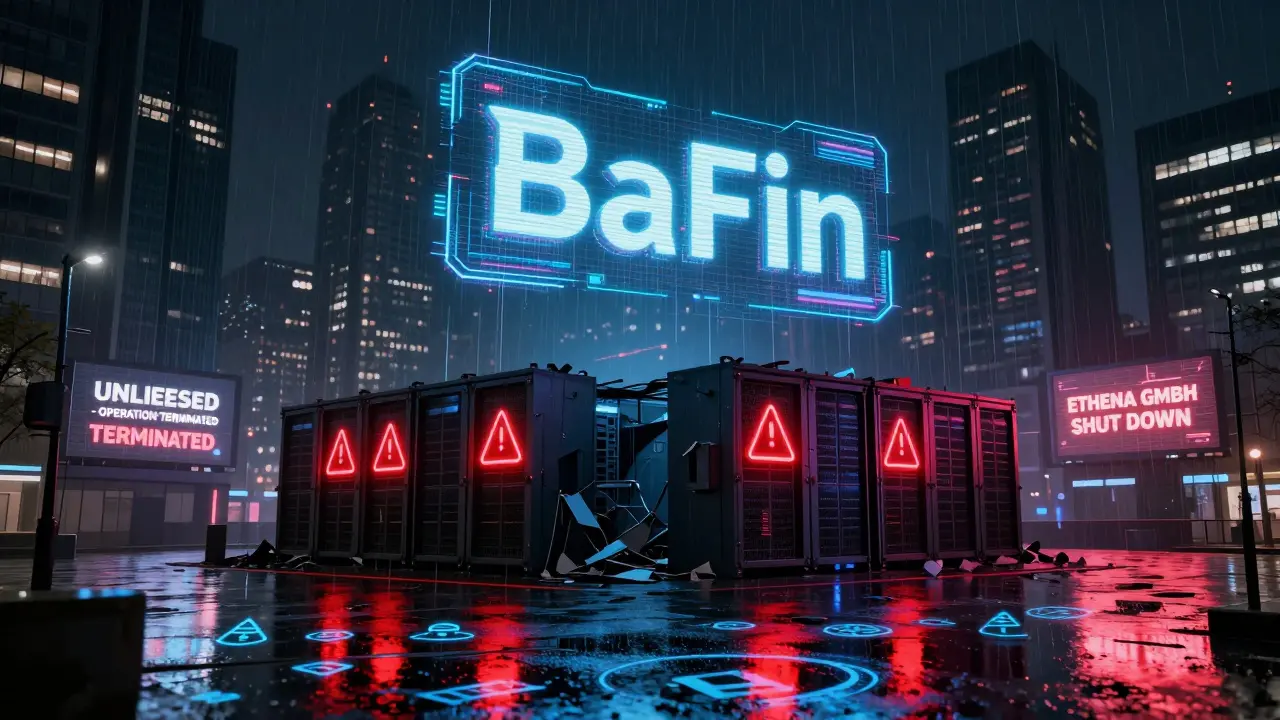German Crypto Custody Compliance Cost Calculator
Compliance Cost Estimator
Estimate your minimum compliance costs based on German regulatory requirements (as of 2025)
Important Note: These are estimated costs based on the latest regulations. Actual costs may vary based on your specific implementation, business model, and regulatory interpretations. The article mentions that 54% of German crypto firms spent over €250,000 on compliance last year.
Germany doesn’t just allow crypto custody - it controls it. If you’re holding or managing digital assets in Germany, you’re not just dealing with technology. You’re navigating one of the most detailed, strict, and legally complex custody frameworks in Europe. And it’s not optional. Starting January 1, 2025, every company offering crypto custody services must be licensed by BaFin - no exceptions.
Why Germany’s Rules Are Different
Most countries treat crypto like a new kind of money. Germany treats it like a financial instrument. That’s the difference. Since 2020, Germany has required licenses for anyone storing private keys on behalf of others. But in 2025, that rule got even tighter. The EU’s Markets in Crypto-Assets Regulation (MiCAR) became law, and Germany didn’t just adopt it - it layered it on top of its own Banking Act (KWG). That means two sets of rules now apply at once.This isn’t just bureaucracy. It’s about asset protection. Under German law, your crypto can’t be mixed with the custodian’s money. Not even digitally. If a company goes bankrupt, your Bitcoin or Ether must still be there - untouched, unclaimed, and separate. That’s why BaFin demands physical or logical segregation of assets. No shared wallets. No commingled holdings. Just pure, isolated custody.
What Counts as Custody - And What Doesn’t
Not every crypto service needs a license. But the line is razor-thin. Under German law, three activities trigger licensing:- Pure custody: Holding private keys for clients (even if you never touch the assets)
- Administration: Managing transactions, signing, or approving transfers on behalf of clients
- Safeguarding: Protecting assets from theft, loss, or unauthorized access
If you do any of these, you’re a regulated entity. But if you’re just running a wallet app where users control their own keys? You’re fine. Same if you’re a DeFi protocol that doesn’t touch private keys. Germany’s rules target intermediaries - not users.
There’s another twist: crypto assets are split into two categories. Bitcoin and Ether? They fall under MiCAR. But if your token is a security - like a tokenized stock, bond, or share in a company - it’s treated as a civil law security under MiFID II. That means even stricter rules. And yes, that creates legal gray zones. A token that’s a utility token today could be reclassified as a security tomorrow, forcing a custodian to relicense overnight.
The Licensing Process: 47 Documents, 7 Months, No Shortcuts
Getting licensed isn’t a form you fill out. It’s a project. BaFin requires 47 separate documents. That includes:- Detailed business plans showing how you’ll handle 10,000+ clients
- Organizational charts with three lines of defense (compliance, risk, operations)
- IT security architecture diagrams showing cold storage, multi-sig setups, and access controls
- Proof of €125,000 in minimum capital - up to €730,000 if you offer multiple services
- Proof that your two senior managers passed BaFin’s ‘fitness and propriety’ check
The average wait time? 7.2 months. Some firms have waited over a year. And rejection rates are high - 22% of first applications get turned down because of weak AML systems. BaFin doesn’t just want your KYC forms. They want to see how you monitor every transaction for suspicious behavior - in real time.
There’s one loophole: if you’re already a licensed bank or financial institution under MiFID II, you can use a fast-track process. Deutsche Bank cut its licensing time from 9 months to 3 months. But for startups? No shortcuts.

Technical Requirements: Cold Storage, Multi-Sig, and EAL 4+ Certification
You can’t just use a software wallet and call it a day. BaFin demands enterprise-grade security:- 95% of assets must be stored in cold wallets - offline, disconnected, physically secured
- Multi-signature wallets must use at least 3-of-5 key holders - no single person can move funds
- Physical facilities need biometric access, 24/7 surveillance, and tamper-proof vaults
- Hardware wallets must meet Common Criteria EAL 4+ certification - the same standard used for military-grade devices
- Software systems need quarterly penetration tests by independent third parties - results submitted to BaFin
And it’s not enough to have these systems. You have to prove they work. Every 30 days after licensing, you must complete internal compliance training. Every 60 days, you submit your first regulatory report. Every quarter, you update your security logs. It’s continuous monitoring - not a one-time setup.
Who’s Winning - And Who’s Getting Left Behind
The market is split. On one side: big banks. Deutsche Bank, Commerzbank, and DZ Bank now control 58% of all crypto assets under custody in Germany. They had the capital, the compliance teams, and the existing licenses to move fast.On the other side: crypto-native firms. Coinbase Custody and Finoa hold 27% combined. But they’re feeling the squeeze. One German startup, Ethena GmbH, was shut down by BaFin in June 2025 over USDe stablecoin compliance issues. Token holders had until August 6 to redeem - or lose everything.
Smaller players are struggling. A June 2025 survey by Blockchain Bundesverband found that 54% of German crypto firms spent over €250,000 on compliance last year - nearly 50% more than the EU average. Many founders say the process is “excessively bureaucratic.” But here’s the irony: those same firms have the highest customer satisfaction. Trustpilot ratings for licensed German custodians average 4.3 out of 5 - mostly because users feel safer.

What’s Coming Next: DAC 8, Tax Changes, and Civil Law Redefinition
The rules aren’t done changing. By Q4 2025, all custodians must build new technical interfaces to report crypto transactions to German tax authorities under DAC 8 - part of the OECD’s global reporting framework. That means every transfer, every swap, every staking reward must be tracked and reported.And taxes? They just got more complicated. Active staking (like running a validator node) is now taxed as commercial income. Passive staking (like earning rewards from a platform) is treated as capital gains. DeFi interactions? Still murky, but BaFin says they’ll issue guidance by 2026.
The biggest shift might come in 2026, when Germany revises its civil securities law. Right now, security tokens are regulated under MiFID II. But if the new law classifies more tokens as civil law securities - as experts predict - then custody will require a full banking license, not just a financial services license. That could force dozens of firms to shut down or restructure.
Is Germany’s System Too Strict?
Switzerland lets firms test services in a sandbox. France only requires registration. Germany demands full licensing, capital reserves, and 47 documents. Is that overkill?For institutional investors? No. BlackRock says BaFin’s clarity let them build compliant custody solutions with confidence. 63% of DAX 30 companies now use German custody providers. That’s not accidental. It’s by design.
For startups? Absolutely. The cost and complexity are barriers. But Germany isn’t trying to be the easiest market. It’s trying to be the safest. And in 2025, that’s what matters most.
Assets under custody in Germany hit €48.7 billion in June 2025 - up 28% from last year. That growth didn’t happen because the rules were easy. It happened because they were reliable.
Do I need a license to hold crypto in Germany?
No. If you’re holding crypto for yourself - using your own wallet, controlling your own keys - you don’t need a license. The rules only apply to businesses that hold crypto on behalf of others. That includes exchanges, custodians, and platforms that manage private keys for users.
Can I use a non-German crypto custodian in Germany?
Technically, yes - but only if they’re licensed by BaFin. Germany doesn’t recognize foreign licenses. Even if you use Coinbase or Kraken, they must have a German license to legally custody assets for German residents. Many international firms opened German subsidiaries in 2025 to comply. If a provider isn’t on BaFin’s official license list, you’re at legal risk.
What happens if a German crypto custodian goes bankrupt?
Your assets are protected. German law requires strict segregation - your crypto can’t be touched by creditors. BaFin mandates that client assets be held in separate wallets, and in insolvency, they’re returned directly to you. This is one of the strongest investor protections in the world. It’s why institutions like BlackRock and DZ Bank trust German custody providers.
Are staking rewards taxable in Germany?
Yes, and it depends on how you earn them. If you actively run a validator node (active staking), it’s taxed as commercial income. If you earn rewards passively through a platform (like a staking pool), it’s treated as capital gains. The tax rules changed in March 2025. Keep detailed records - BaFin and the tax office will ask for them.
How long does it take to get a crypto custody license in Germany?
On average, 7 to 9 months. For institutions already licensed under MiFID II, it can drop to 3 months. For new startups, expect delays. BaFin reviews every application thoroughly, and incomplete documentation can add months. You need proof of capital, security systems, compliance staff, and detailed business plans. Rushing it leads to rejection.
What’s the minimum capital needed for a crypto custody license in Germany?
€125,000 for pure custody services. If you offer additional services - like trading, exchange, or administration - you need up to €730,000 in capital. This isn’t just a formality. BaFin checks bank statements and requires the funds to be held in a German account. It’s meant to ensure the company can survive a crisis without putting client assets at risk.
Are stablecoins regulated differently in Germany?
Yes. Stablecoins tied to fiat currencies (like USDT or USDC) are treated as electronic money under MiCAR. But if they’re algorithmic or unbacked (like Ethena’s USDe), they’re considered high-risk. BaFin shut down Ethena GmbH in June 2025 for failing to meet reserve and transparency rules. Any stablecoin issuer or custodian in Germany must prove full backing, regular audits, and redemption guarantees.
Can I operate a crypto custody business from outside Germany?
No. If you’re offering custody services to German residents - even remotely - you must be licensed by BaFin. Location doesn’t matter. If your website accepts German customers, you’re subject to German law. Many foreign firms now operate through German subsidiaries to comply. Trying to bypass this risks fines, asset freezes, or criminal charges.






Comments
15 Comments
Louise Watson
Germany doesn't play games.
Emily Unter King
The EAL 4+ certification requirement alone is a non-starter for most DeFi-native teams. We're talking military-grade hardware for digital assets that exist in code. It's like requiring a vault for a tweet. The compliance overhead is so absurd it's practically a subsidy for incumbents.
Kevin Mann
Let me tell you something-this is the most beautiful thing I’ve ever seen in crypto regulation. I’ve watched so many exchanges get hacked, disappear, leave people with nothing. I’ve seen the tears in Reddit threads, the lawsuits, the ruined lives. And now? Germany says: ‘No more.’ Your Bitcoin isn’t a gamble-it’s your life savings. So lock it in a vault, hire five compliance officers, spend a year on paperwork. Worth it. Every. Single. Penny. I’ve got my ETH in a German custodian now. I sleep like a baby. You want safety? You don’t get it by hoping. You get it by demanding it. BaFin didn’t just make rules-they made a promise. And they’re keeping it.
John Doe
Let’s be honest-this isn’t about investor protection. It’s about control. BaFin is building a digital iron curtain. Every keystroke, every wallet address, every staking reward-tracked, logged, reported. And who benefits? The same banks that got bailed out in 2008. The same institutions that turned crypto into a compliance tax. This is the quiet death of decentralization-wrapped in legal jargon and EAL 4+ certification. They’re not securing your assets-they’re securing their monopoly. And don’t tell me ‘it’s for safety.’ If safety was the goal, they’d let you run your own node. But they don’t want you to be free. They want you to be registered.
Kathy Ruff
People are freaking out about the 47 documents, but have you looked at what banks have to do for traditional finance? It’s worse. The difference is, crypto is new, so everything feels overwhelming. But once you get past the initial shock, this is actually the most responsible framework in the world. The segregation requirement alone? That’s a game-changer. I’ve seen too many ‘custodians’ treat client funds like their own. This shuts that down. It’s not perfect-but it’s the best we’ve got.
Alexis Rivera
The fact that 63% of DAX 30 companies now use German custody providers tells you everything. This isn’t about being difficult-it’s about being trustworthy. Switzerland has the sandbox. Germany has the safety net. And when you’re managing institutional capital, you don’t want a sandbox. You want a fortress. The startups complaining? They’re not being crushed by bureaucracy-they’re being outpaced by maturity. The market is rewarding rigor, not rebellion. And that’s not a bug. It’s a feature.
Cydney Proctor
Oh, how quaint. A country that thinks you need a degree in compliance to hold Bitcoin. I’m sure the average German citizen finds this deeply empowering. Meanwhile, in places where people actually trust themselves, they just… use wallets. No forms. No auditors. No €730,000 capital requirements. Just keys. And somehow, the world still turns. Germany isn’t leading innovation. It’s building a museum of crypto-with the lights off and the doors locked.
Finn McGinty
Let me just say this-Germany has become the Switzerland of crypto regulation, and I’m not being sarcastic. The level of legal clarity here is unprecedented. I’ve worked with custody providers in Luxembourg, Singapore, even Wyoming. None of them can match this. The segregation rules? The capital requirements? The quarterly penetration tests? It’s not just thorough-it’s surgical. And yes, it’s expensive. But if you’re serious about institutional adoption, you don’t want ‘fast and loose.’ You want ‘slow and bulletproof.’ This is the gold standard. The rest are just playing dress-up.
Cierra Ivery
Wait-so if I run a wallet app where users control their own keys, I’m fine? But if I offer a ‘signing service’-even if I never touch the keys-I need a license? That’s insane. So the line between ‘custody’ and ‘not custody’ is defined by whether you’re touching the keys-or just telling someone else to touch them? This isn’t regulation. It’s legal magic. And the fact that BaFin can reclassify a token as a security overnight? That’s not stability-that’s regulatory whiplash. You can’t build a business on rules that change while you’re sleeping.
Ryan Inouye
Let me guess-this is what happens when you let bureaucrats design technology. The U.S. is too lazy to regulate. China is too authoritarian. But Germany? They’ve found the perfect middle ground: a thousand forms, a decade of waiting, and a 22% rejection rate-all while the rest of the world moves on. And you call this ‘safety’? No. This is the death of innovation disguised as protection. If you want to keep your crypto safe, keep it in your own wallet. Not in some German bank’s cold storage with seven layers of bureaucracy between you and your keys.
Grace Huegel
I’m not here to defend bureaucracy. But I am here to say this: after watching three different crypto firms collapse in 2022, I don’t care how long the process is. I don’t care how many documents they ask for. I just want to know that if I lose my keys, I’m not losing my life savings. And that’s what Germany gives me. The fact that my assets are legally separate from the custodian’s balance sheet? That’s not a feature. That’s a lifeline. The rest of the world is still pretending this isn’t a financial system. Germany is treating it like one.
Veeramani maran
bro i tried to get licensed in germany last year… the 47 docs? real. one of them asked for a flowchart of how my team handles coffee breaks during audits. i swear to god. and the capital? i had to borrow from my uncle in mumbai. still got rejected. but now i see why… i saw a friend’s assets get frozen on a us exchange. i’d rather wait 9 months than lose everything. this is not perfect… but it’s the only thing that actually works.
Eric von Stackelberg
They’re not just regulating custody-they’re building a surveillance infrastructure. Every transaction reported under DAC 8. Every staking reward logged. Every cold storage access monitored. And don’t think for a second that this data stays with BaFin. The moment a government has a complete ledger of every crypto movement within its borders, it doesn’t just regulate-it controls. This isn’t about investor safety. It’s about total financial visibility. And if you think this won’t be used to freeze accounts, restrict access, or even confiscate assets under ‘national security’ grounds-you’re not paying attention.
Robin Hilton
Germany’s system is a joke. You need €730,000 in capital to custody crypto? That’s more than the GDP of some Caribbean islands. Meanwhile, a teenager in Nigeria runs a hot wallet for 500 people and never gets audited. The whole thing is a protection racket for big banks. And the fact that people call this ‘safety’? That’s the real tragedy. You don’t make crypto safe by making it expensive. You make it safe by making it decentralized. Germany is turning Bitcoin into a bank account with extra steps.
Michelle Sedita
I used to think crypto was about freedom. Now I think it’s about trust. And Germany? They’ve built a system where trust isn’t assumed-it’s earned. Every line of code, every vault, every compliance officer is there because someone, somewhere, lost everything. I don’t need a sandbox. I need a guarantee. And for the first time in this industry, Germany is giving me one. I’m not here to cheerlead bureaucracy. But I am here to say: if you want your money to survive the next crash, you don’t want a startup. You want a German custodian.
Write a comment